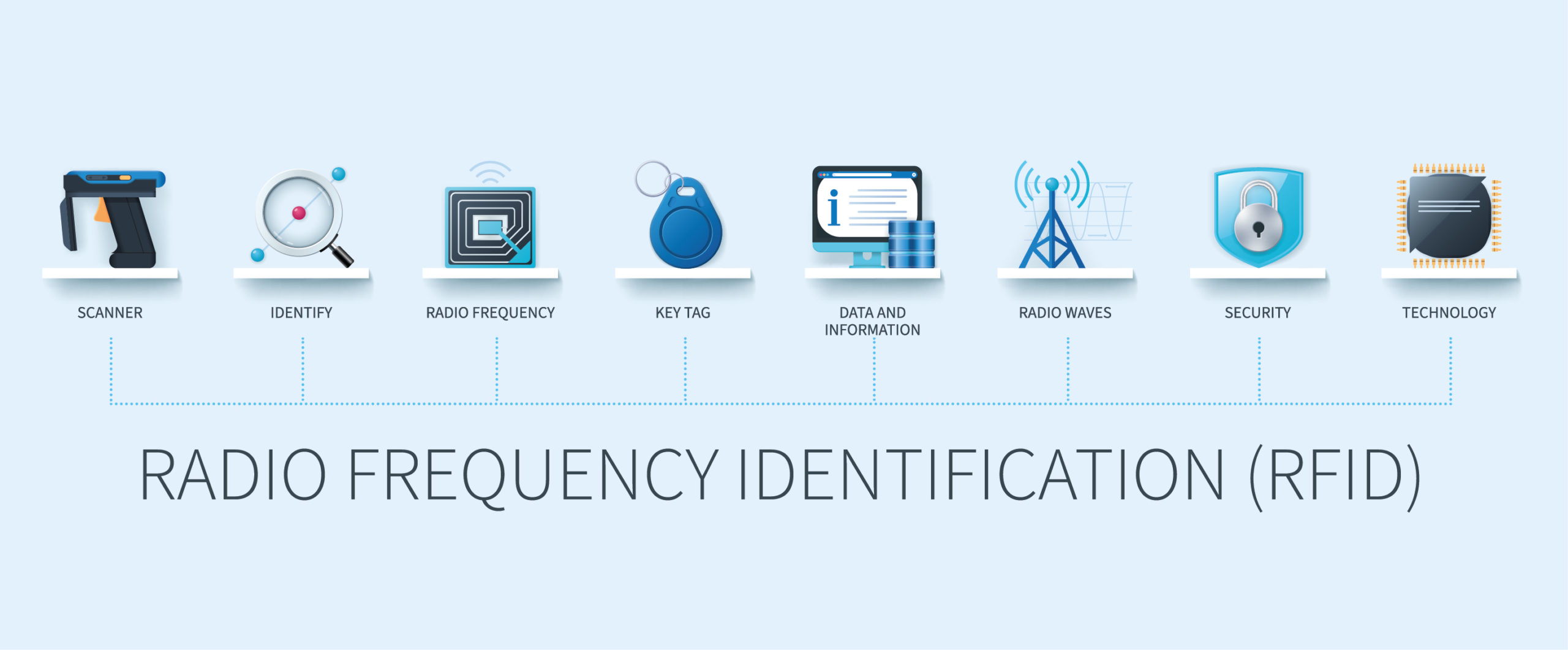In this section, we focus on the use of RFID in manufacturing, exploring how this technology can be applied to improve efficiency, traceability, quality, and safety in production processes. Manufacturing is a complex and dynamic environment where precision and efficiency are key to maintaining competitiveness and quality. RFID offers innovative solutions to address these challenges, enabling more accurate and real-time management of operations.
RFID in Manufacturing
RFID (Radio-Frequency Identification) technology is revolutionizing various industrial sectors, including manufacturing. If you are not familiar with the basic principles of this technology, we recommend consulting our introductory RFID guide, where we explain in detail how it works and what its main components are.

The Impact of RFID in Manufacturing
The adoption of RFID in the manufacturing sector has proven to have a significant impact on various operational aspects. The applications of this technology range from inventory monitoring to product traceability, quality control, and automation of production processes. Let’s see how RFID can transform each stage of production:

This section is designed to provide an in-depth view of how RFID can be used in the manufacturing context, with practical examples and case studies from companies that have successfully implemented this technology. Our goal is to help you understand the benefits and potential of RFID, preparing you to consider adopting this technology for your business.
Applications of RFID Technology in Manufacturing
RFID technology offers numerous opportunities for improvement in the manufacturing sector, both in terms of efficiency and traceability and security. In this chapter, we will examine the main applications of RFID in manufacturing, illustrating how this technology can be integrated into various production processes.
Inventory Monitoring and Management
RFID is extremely useful for inventory monitoring and management. By applying RFID tags to raw materials, components, and finished products, companies can gain real-time visibility of inventory, automatically updating stock levels through RFID readers installed in warehouses and along production lines. This reduces manual errors, ensuring more accurate data and improving supply chain management. Additionally, logistics benefit greatly from this technology, enabling more efficient resource management and optimizing production planning.
Production Traceability
The implementation of RFID allows for complete product traceability throughout the production process. Every product can be tracked from production to distribution, with the ability to record crucial information such as production date, batch, and processing details. This level of traceability ensures that quality issues can be identified and resolved quickly, facilitating timely interventions. Additionally, RFID technology helps companies comply with regulations, especially in regulated sectors such as food or pharmaceuticals, providing detailed documentation in case of inspections.
Quality Control
Integrating RFID into quality control processes leads to significant improvements. RFID systems can automate quality checks, reducing the need for manual intervention. RFID tags, containing detailed information on quality parameters, allow for quick and accurate verification during inspections. Furthermore, every quality control performed can be recorded on the tag, creating a detailed and easily accessible history, useful for subsequent analysis and verification.
Product Security and Authentication
Product security and authentication are crucial in many manufacturing sectors, and RFID offers effective solutions in this field. RFID tags, being unique and encrypted, make it difficult to counterfeit products, ensuring their authenticity. RFID readers can verify the authenticity of products in real-time along the distribution chain, reducing the risk of fraud. Additionally, the information stored in RFID tags can be password-protected and encrypted, ensuring the security of sensitive data.

Automation of Production Processes
RFID is essential for automating production processes, significantly contributing to operational efficiency. By integrating RFID with automation systems such as robots and CNC machines, companies can manage operations in a coordinated and automated manner. The ability to track the status of machinery and production lines in real-time enables timely interventions in case of malfunctions, reducing downtime. Moreover, RFID facilitates workflow management, optimizing resource allocation and improving overall productivity.
Benefits of RFID in Manufacturing
The implementation of RFID technology in manufacturing offers a wide range of benefits that go beyond mere process automation. This chapter will explore the main advantages of RFID, highlighting how this technology can transform production operations, improve efficiency, and reduce costs.
Operational Efficiency
One of the main advantages of RFID is the increase in operational efficiency. Thanks to the ability to track and monitor raw materials, components, and finished products in real-time, companies can optimize their internal processes. Continuous visibility of materials along the production chain allows for more precise resource management, reducing downtime and improving coordination between different departments.
Reduction of Errors and Costs
Automating inventory and quality control processes through RFID significantly reduces human errors. This leads to a decrease in missing or incorrect stocks and, consequently, a reduction in costs associated with inventory management and returns of defective products. Improved accuracy translates into more reliable data and better operational planning.

Improved Traceability and Transparency
Traceability is crucial in manufacturing, especially in regulated industries such as food and pharmaceuticals. RFID allows for tracking every stage of the product's life cycle, from production to distribution. This traceability ensures total transparency, facilitating regulatory compliance and increasing customer trust. In case of quality issues, traceability allows for quick identification of the problem's origin and timely intervention.
Optimized Inventory Management
Inventory management is a critical aspect for any manufacturing company. With RFID, real-time visibility of inventory levels is possible, allowing for the anticipation of supply needs and preventing both stockouts and overstock. This level of control helps reduce storage costs and improve inventory turnover, making warehouse management more efficient.
Increased Security
RFID significantly contributes to product security and counterfeiting prevention. Thanks to unique and encrypted tags, product authenticity can be guaranteed, and sensitive information can be protected. Moreover, RFID can be used to control access to certain areas of the factory or specific information, improving overall workplace security.
Implementing RFID Technology in Manufacturing
Implementing RFID technology in manufacturing requires careful planning and a deep understanding of the company’s specific needs. This chapter will provide a detailed guide on key factors to consider, integrating with existing systems, selecting suitable hardware and software, and best practices to ensure effective implementation.
Key Factors to Consider
Before implementing RFID, it is essential to evaluate several factors to ensure the chosen solution meets the company's needs:
- Needs Analysis: Identify the specific areas where RFID can provide the most benefits, such as inventory management, production traceability, or quality control.
- Goals: Clearly define the goals of the implementation, both short-term and long-term, to measure the system’s effectiveness.
- Budget: Establish a realistic budget that considers all costs.
- Work Environment: Assess the work environment, including physical conditions and potential interferences, to select the most suitable RFID hardware.

Integration with Existing Systems
RFID implementation must be smoothly integrated with existing systems to maximize efficiency:
- Compatibility: Ensure that the RFID system is compatible with the business management systems already in use, such as ERP (Enterprise Resource Planning) and WMS (Warehouse Management System).
- Communication Interfaces: Use standardized communication interfaces to facilitate data integration between different systems.
- Data Synchronization: Implement solutions for real-time data synchronization, ensuring all information is up to date and accessible at any time.
Selecting Suitable Hardware and Software
Choosing the right hardware and software is crucial for a successful implementation:
- RFID Tags: Choose RFID tags suitable for specific operational conditions, considering factors such as resistance to extreme temperatures, humidity, and mechanical stress.
- RFID Readers: Select RFID readers with the right range and reading capacity, positioning them strategically along the production chain to maximize effectiveness.
- Management Software: Opt for RFID management software that offers advanced functionality for monitoring and data analysis, integrating easily with other business systems.
Best Practices for Effective Implementation
Following some best practices can facilitate a smooth transition to RFID use:
- Staff Training: Ensure that staff are adequately trained to use and maintain the RFID system, understanding the benefits and features of the technology.
- Pilot Planning: Start with a pilot project to test the RFID solution in a limited area, identifying and resolving any issues before extending the implementation to the entire company.
- Monitoring and Evaluation: Continuously monitor the performance of the RFID system and gather user feedback to make ongoing improvements.
- Maintenance and Updates: Establish a regular maintenance schedule and update the RFID system to ensure its efficiency and security over time.
Future Trends of RFID in Manufacturing
Integration with IoT (Internet of Things)
The Internet of Things is transforming how companies operate, and the integration of RFID with IoT devices is expected to grow. This combination will allow for even more detailed data collection and more efficient real-time management. IoT sensors, along with RFID tags, can monitor various environmental and operational parameters, improving visibility and control over production processes.
Development of Advanced RFID Tags
RFID tag technology continues to evolve, with the development of smaller, cheaper tags with greater memory capacity and durability. These advanced tags can be used in a wider range of applications, including those requiring extreme operating conditions. Moreover, the ability to add advanced security features will make RFID tags even more robust against counterfeiting.

Increased Adoption of Blockchain
The adoption of blockchain in combination with RFID promises to further enhance traceability and security. Blockchain can provide an immutable and transparent record of transactions, ensuring the integrity of the data collected by RFID tags. This will be particularly useful in industries where product provenance and authenticity are crucial.
Automation and Artificial Intelligence (AI)
The integration of RFID with automation systems and artificial intelligence will further optimize production processes. AI can analyze the data collected by RFID tags to identify patterns, predict failures, and optimize preventive maintenance. Automation, supported by RFID data, will improve productivity and reduce human error.
Conclusions
We have explored in detail the potential and benefits of RFID technology in the manufacturing sector, from inventory management to traceability, quality control to product security, and automation of production processes. Now it’s time to consider how your company can benefit from these innovative solutions and take the next step towards an effective digital transformation.
Discover Custom RFID Solutions for Your Company
Our company specializes in designing and providing tailored RFID solutions, designed to meet the specific needs of the manufacturing sector. We don’t just resell standard tags but create customized solutions that perfectly match your company’s operating conditions and business goals. Whether you are looking to improve operational efficiency, increase product traceability, or enhance process security, we have the expertise and technologies to support you.
Why Choose Us?
Experience and Expertise: With years of experience in the industry, we offer in-depth know-how and a clear understanding of the specific challenges of manufacturing. Our team of experts is ready to guide you through every stage of implementation, from design to realization.
Tailored Solutions: Every company has unique needs, and we are committed to providing custom RFID solutions that precisely meet your requirements. We analyze your work environment and processes to develop a solution that maximizes efficiency and return on investment.
Ongoing Support: We don’t just provide solutions; we also offer ongoing support to ensure that the RFID system operates at its full potential. We are here to assist you with staff training, system maintenance, and technology upgrades.
RFID technology represents an extraordinary opportunity to transform production operations, improve efficiency, and increase your company’s competitiveness. Don’t hesitate to contact us to find out how we can help you integrate this innovative technology into your production processes. Together, we can achieve new levels of success and innovation in manufacturing.
Contact us today to start your journey towards more efficient and advanced production with custom RFID solutions.


